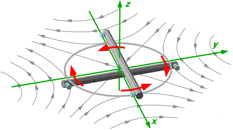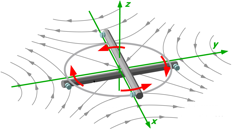Tuning in to gravity
Depending on their source, gravity waves—never-detected ripples in spacetime that result from massive accelerating bodies—could appear at almost any frequency. Each gravity-wave detector is designed to be sensitive over a different stretch of the spectrum. Now, writing in Physical Review Letters, a team of scientists in Japan describes early tests of a detector that is sensitive over a frequency range not currently completely captured by others.
Last year, Masaki Ando, at Kyoto University, and colleagues proposed building a detector that senses gravity waves by tracking the relative angle between two suspended bar-masses. This torsion-bar antenna, or “TOBA,” would be sensitive to gravity waves between 1mHz and 1Hz, a frequency range below that of the ground-based detector LIGO, but above that of the proposed space-based interferometer LISA.
In a first test of their detector’s sensitivity, the same group has designed a mini-version consisting of an upside-down T-shaped bar (about 22cm across). A magnet on one end of the bar allows the team to suspend the mass, free of contact, from a superconducting pivot, while a laser interferometry setup tracks the deflections in the bar.
The miniature TOBA provides an early estimate of the detector’s sensitivity, but the team expects three more stages of design before they scale up to a final version with 10- m-wide bars. – Jessica Thomas





